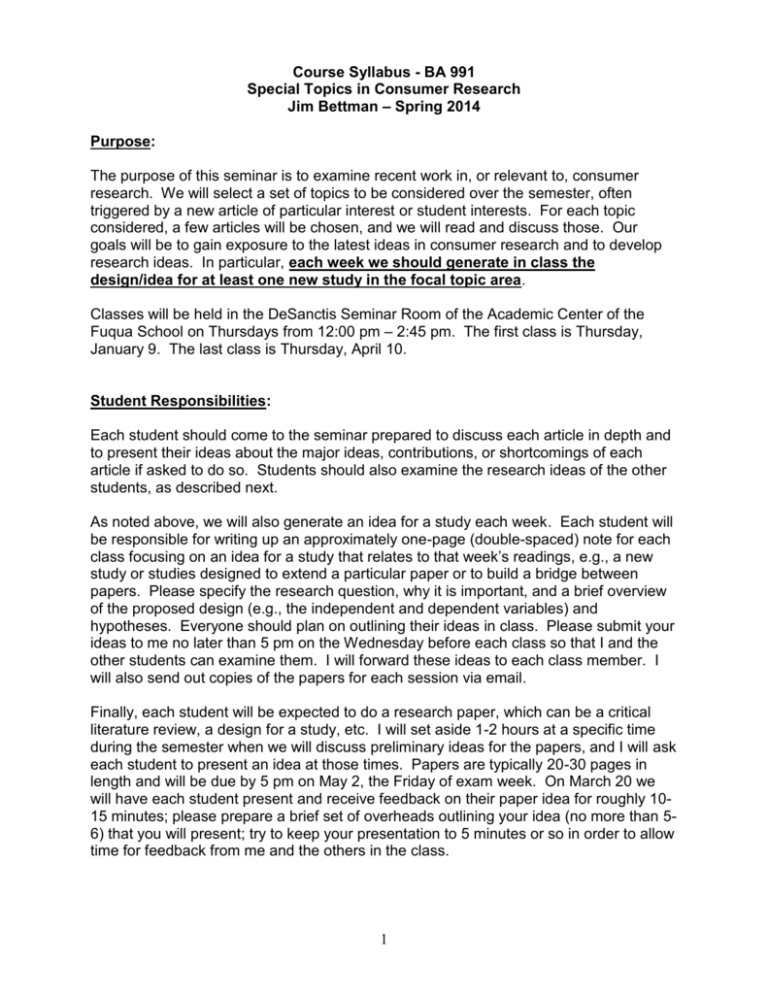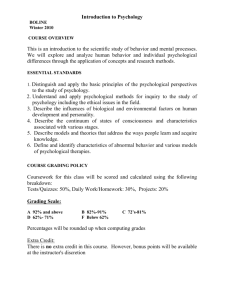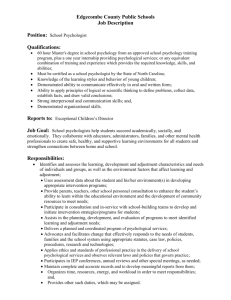BA991 Course Syllabus, Spring 2014
advertisement

Course Syllabus - BA 991 Special Topics in Consumer Research Jim Bettman – Spring 2014 Purpose: The purpose of this seminar is to examine recent work in, or relevant to, consumer research. We will select a set of topics to be considered over the semester, often triggered by a new article of particular interest or student interests. For each topic considered, a few articles will be chosen, and we will read and discuss those. Our goals will be to gain exposure to the latest ideas in consumer research and to develop research ideas. In particular, each week we should generate in class the design/idea for at least one new study in the focal topic area. Classes will be held in the DeSanctis Seminar Room of the Academic Center of the Fuqua School on Thursdays from 12:00 pm – 2:45 pm. The first class is Thursday, January 9. The last class is Thursday, April 10. Student Responsibilities: Each student should come to the seminar prepared to discuss each article in depth and to present their ideas about the major ideas, contributions, or shortcomings of each article if asked to do so. Students should also examine the research ideas of the other students, as described next. As noted above, we will also generate an idea for a study each week. Each student will be responsible for writing up an approximately one-page (double-spaced) note for each class focusing on an idea for a study that relates to that week’s readings, e.g., a new study or studies designed to extend a particular paper or to build a bridge between papers. Please specify the research question, why it is important, and a brief overview of the proposed design (e.g., the independent and dependent variables) and hypotheses. Everyone should plan on outlining their ideas in class. Please submit your ideas to me no later than 5 pm on the Wednesday before each class so that I and the other students can examine them. I will forward these ideas to each class member. I will also send out copies of the papers for each session via email. Finally, each student will be expected to do a research paper, which can be a critical literature review, a design for a study, etc. I will set aside 1-2 hours at a specific time during the semester when we will discuss preliminary ideas for the papers, and I will ask each student to present an idea at those times. Papers are typically 20-30 pages in length and will be due by 5 pm on May 2, the Friday of exam week. On March 20 we will have each student present and receive feedback on their paper idea for roughly 1015 minutes; please prepare a brief set of overheads outlining your idea (no more than 56) that you will present; try to keep your presentation to 5 minutes or so in order to allow time for feedback from me and the others in the class. 1 Papers for BA991, Spring 2014 Session 1 – Recent Research on Happiness – January 9, 2014 a. Bhattacharjee, Amit and Cassie Mogilner (2014), “Happiness from Ordinary and Extraordinary Experiences,” JCR, 41 (June). b. Mogilner, Cassie, Sepandar D. Kamvar, and Jennifer Aaker (2011), “The Shifting Meaning of Happiness,” Social Psychological and Personality Science, 2 (4), 395-402. c. Baumeister, Roy F., Kathleen D. Vohs, Jennifer L. Aaker, and Emily N. Garbinsky (2013), “Some Key Differences between a Happy Life and a Meaningful Life,” Journal of Positive Psychology. Session 2 – Effects of Disease Threat – January 16, 2014 a. Schaller, Mark and Justin H. Park (2011), “The Behavioral Immune System (and Why It Matters),” Current Directions in Psychological Science, 20 (2), 99-103. b. Park, Justin H., Mark Schaller, and Christian S. Crandall (2007), “PathogenAvoidance Mechanisms and the Stigmatization of Obese People,” Evolution and Human Behavior, 28 (November), 410-414. c. White, Andrew Edward, Douglas T. Kenrick, and Steven L. Neuberg (2013), “Beauty at the Ballot Box: Disease Threats Predict Preferences of Physically Attractive Leaders,” Psychological Science, 24 (12), 2429-2436. d. Schaller, Mark and Damian R. Murray (2008), “Pathogens, Personality, and Culture: Disease Prevalence Predicts Worldwide Variability in Sociosexuality, Extraversion, and Openness to Experience,” Journal of Personality and Social Psychology, 95 (1), 212-221. e. Mortensen, Chad R., D. Vaughn Becker, Joshua M. Ackerman, Steven L. Neuberg, and Douglas T. Kenrick (2010), “Infection Breeds Reticence: The Effects of Disease Salience on Self-Perceptions of Personality and Behavioral Avoidance Tendencies,” Psychological Science, 21 (3), 440-447. Session 3 – Scarcity, Stress, and Eating – January 23, 2014 a. Briers, Barbara and Sandra Laporte (2013), “A Wallet Full of Calories: The Effect of Financial Dissatisfaction on the Desire for Food Energy,” Journal of Marketing Research, 50 (December), 767-781. b. Briers, Barbara, Mario Pandelaere, Siegfried Dewitte, and Luk Warlop (2006), “The Desire for Calorie Resources Increases the Desire for Financial Resources and Vice Versa,” Psychological Science, 17 (November), 939-943. c. Sproesser, Gudrun, Harald T. Schupp, and Britta Renner (forthcoming), “The Bright Side of Stress-Induced Eating: Eating More When Stressed but Less When Pleased,” Psychological Science. Session 4 – New Perspectives on Prosocial Behavior – January 30, 2014 a. Newman, George E. and Daylian M. Cain (2014), “Tainted Altruism: When Doing Some Good is Evaluated as Worse Than Doing No Good at All,” Psychological Science. 2 b. Nadler, Arie and Lily Chernyak-Hai (2014), “Helping Them Stay Where They Are: Status Effects on Dependency/Autonomy-Oriented Helping,” Journal of Personality and Social Psychology, 106 (1), 58-72. c. Ahn, Hee-Kyung, Hae Joo Kim, and Pankaj Aggarwal (2014), “Helping Fellow Beings: Anthropomorphized Social Causes and the Role of Anticipatory Guilt,” Psychological Science, 25 (1), 224-229. Session 5 – Status Signals – February 6, 2014 a. Bellezza, Silvia, Francesca Gino, and Anat Keinan (2014), “The Red Sneakers Effect: Inferring Status and Competence from Signals of Nonconformity,” Journal of Consumer Research. b. McFerran, Brent and Jennifer J. Argo (2014), “The Entourage Effect,” Journal of Consumer Research. c. Sharma, Eesha and Adam L. Alter (2012), “Financial Deprivation Prompts Consumers to Seek Scarce Goods,” Journal of Consumer Research, 39 (October), 545-560. Session 6 – Decision Making – February 20, 2014 a. Blanchard, Simon J., Kurt A. Carlson, and Margaret G. Meloy (2014), “Biased Predecisional Processing of Leading and Nonleading Alternatives,” Psychological Science. b. Maeng, Ahreum, Robin J. Tanner, and Dilip Soman (2013), “Conservative When Crowded: Social Crowding and Consumer Choice,” Journal of Marketing Research, 50 (December), 739-752. c. Hafenbrack, Andrew C., Zoe Kinias, and Sigal G. Barsade (2014), “Debiasing the Mind Through Meditation: Mindfulness and the Sunk-Cost Bias,” Psychological Science, 25 (February), 369-376. Session 7 – Sharing and Disclosing – February 27, 2104 a. Reis, Harry T., Shannon M. Smith, Cheryl L. Carmichael, Peter A. Caprariello, FenFang Tsai, Amy Rodrigues, and Michael R. Maniaci (2010), “Are You Happy for Me? How Sharing Positive Events With Others Provides Personal and Impersonal Benefits,” Journal of Personality and Social Psychology, 99 (2), 311329. b. Hackenbracht, Joy and Karen Gasper (2013), “I’m All Ears: The Need to Belong Motivates Listening to Emotional Disclosure,” Journal of Experimental Social Psychology, 49 (September), 915-921. c. Berger, Jonah and Katherine L. Milkman (2012), “What Makes Online Content Viral?” Journal of Marketing Research, 49 (April), 192-205. Session 8 – Consumer Indulgence – March 20, 2014 a. Cavanaugh, Lisa (2014), “Because I (Don’t) Deserve It: How Relationship Reminders and Deservingness Influence Consumer Indulgence,” Journal of Marketing Research. 3 b. Salerno, Anthony, Juliano Laran, and Chris Janiszewski (2014), “Hedonic Eating Goals and Emotion: When Sadness Decreases the Desire to Indulge,” Journal of Consumer Research. c. Parker, Jeffrey R. and Donald R. Lehmann (2014), “How and When Grouping LowCalorie Options Reduces the Benefits of Providing Dish-Specific Calorie Information,” Journal of Consumer Research. Session 9 – Student Paper Idea Presentations – March 27, 2014 Session 10 – Financial Decisions – April 3, 2014 a. Fernandes, Daniel, John G. Lynch, Jr., and Richard G. Netemeyer (forthcoming), “Financial Literacy, Financial Education and Downstream Financial Behaviors,” Management Science. b. Gal, David and Blakeley B. McShane (2012), “Can Small Victories Help Win the War? Evidence from Consumer Debt Management,” Journal of Marketing Research, 49 (August), 487-501. c. Hsee, Christopher K., Jiao Zhang, Cindy F. Cai, and Shirley Zhang (2103), “Overearning,” Psychological Science, 24 (June), 852-859. Session 11 – Connection and Authenticity – April 10, 2014 a. Newman, George E. and Ravi Dhar (2014), “Authenticity is Contagious: Brand Essence and the Original Source of Production,” Journal of Marketing Research, 51. b. Chan, Cindy and Cassie Mogilner (2014), “Experiential Gifts Are More Socially Connecting than Material Gifts,” Working paper, Wharton School, University of Pennsylvania. c. Lowe, Michael L. and Kelly L. Haws (2014), “(Im)moral Support: The Social Outcomes of Parallel Self-Control Decisions,” Journal of Consumer Research, 41. 4



